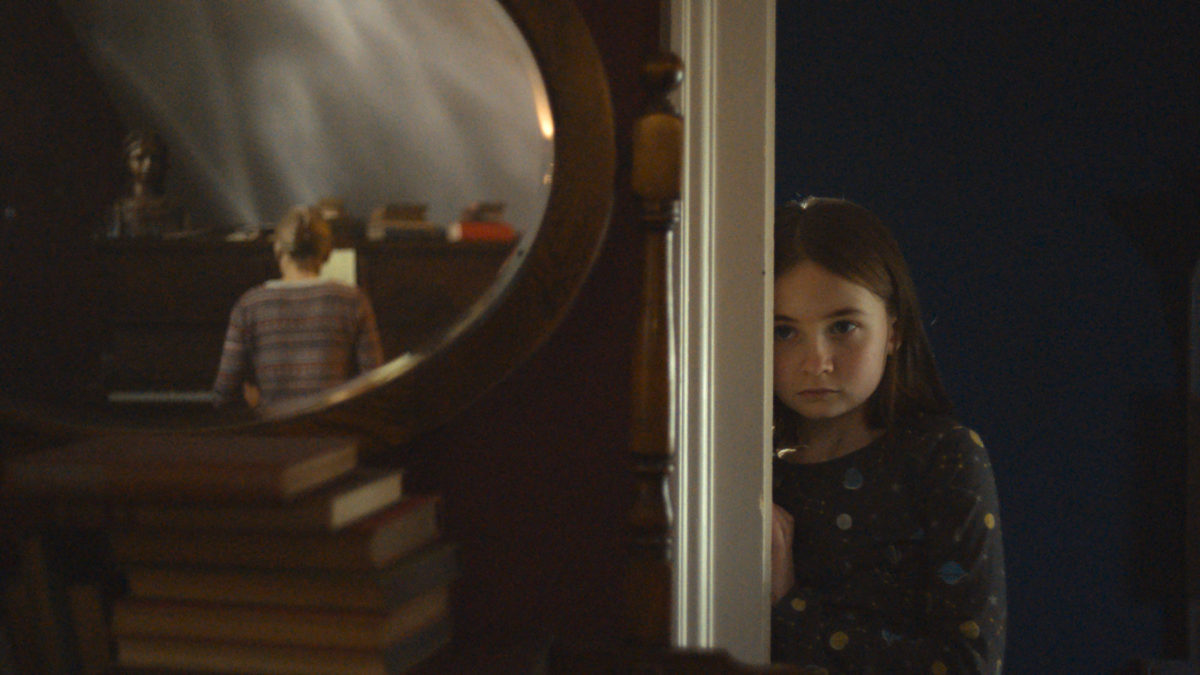What to Watch Verdict
'Martyrs Lane' is a delicate, docile horror story that uses its childhood charms as a means of retelling familiar thematic beats that never lag nor feel repetitious.
Pros
- +
👼 Both tot-aged stars shine.
- +
👼 "Quiet" is rarely a negative qualifier.
- +
👼 It's a clean, crisp production.
Cons
- -
👼 Pace does sputter in spots.
- -
👼 Horror elements are a bit tame.
Martyrs Lane is part of our Fantasia Fest coverage.
A macabre, grim but not Grimm fairytale like Martyrs Lane is a reminder that horror doesn't always have to howl in your face. Ruth Platt scripts and directs an adolescent's perspective on unprecedented grief, which is an alteration that differentiates from many narratively similar but focally opposite tales about hurting families. Platt opts for avenues of curiosity and whimsy as opposed to malignant demons who've violently possessed many a broken household, which reads lukewarm on the Scare-O-Meter. Expect a more emotionally vulnerable dreamlike atmosphere that might lose those adrenaline-junkie genre audiences—the eyes of a child morph fear into fearlessness, which Platt dramatizes through refreshingly sincere childhood explorations.
The small but mighty Kiera Thompson stars as Leah, who lives in a sizable vicarage (clergy house) with her cloth-serving family. Father Thomas (Steven Cree) is always hustling about as the local parishioner, while mother Sarah (Denise Gough) keeps the estate in order. Leah constantly observes whether that be rebellious sister Bex (Hannah Rae) sneaking home after curfew or Sarah's attempts to withhold teary breakdowns. It's easy for Leah to become lost in the bustle, especially once a parentless little girl named Rachel (Sienna Sayer) enters Leah's bedroom after nightfall to play games and leak whereabouts to hidden "treasures" that resurrect suppressed memories within Sarah.
Platt's a bit of a daredevil because Martyrs Lane hinges itself on the performances of single-digits Ms. Thompson and the even more youthful Sienna Sayer. Thompson is the unquestioned lead actress, and Sayer is the apparitional "friend" with angel wings who sells the film's tingles of terror. Their exchanges rely on "Two Truths and a Lie" because evil resides in innocence—Sayers cricks her neck and projects morbid physical reanimations during giggly, smiley playtime. Thompson represents the standout as Leah, whose authenticity while first embracing unknown companionship then spiraling into supernatural uncertainty is the punch-home point once truths become life or death. You'll end up talking about Thompson like Julian Hilliard or Mckenna Grace as an earned comparison to child horror actors.
The centralization of adolescence is like throwing a new coat of paint over traditional haunted house architectures, where hide-and-seek becomes the catalyst for immeasurable trauma. Platt's narrative Pandora's box is opened by someone unable to comprehend the red flags abound, whether that's Thomas and Sarah's wounded conversations or the angelic overnight visitor who appears at a windowsill without explanation. Even better, when Leah does clue into the underworld trickery at play? It's still from the hopeful, effervescently sweet-natured mindset that's like a flashlight shining into shadows with brightness—while still addressing the nastiness and menace that resides in the film's shattering climax. There's something to be said about a softer horror tale that's inarguably well-acted, confidently shot, and appropriate for audiences who can't jump into the fire of mature midnighters right away.
As a counter to the above, there will be viewers who find Martyrs Lane too quiet and subdued. Platt succumbs to a single jump scare that's nothing but fast-motion with human characters and another vengeful glimpse of the film's scorned entity looking properly demon-devious. Performances are there to influence Leah towards Rachel—Bex bullies her little sister to the point of inhaler resuscitation, or Thomas constantly scurries off-premises to hear confessions and bless his congregation. I applaud the angst Denise Gough visibly wears and the scars she attempts to hide, as well as an ending that tugs on heartstrings—it's just not a brand of horror that's durably mainstream. For as accomplished the pint-sized performances are, a few moments lose their overall polish, and the pacing stretches translucently thin as Platt never ventures to hide the tragedy Leah so methodically yet sheepishly unlocks.
Martyrs Lane is not lesser because of the tiptoes around outright frights and imaginative childishness that become Ruth Platt's directorial calling card. It's a lucid lullaby that's never lethargic despite my many attempts to ensure y'all know what intensity level to expect. Imagine if The Night House was told by Mother Goose and from an outsider's perspective (thematic relevance), or align yourself with the feelings that linger after A Dark Song. Platt lands a lasting impact concerning mental health undertones without decapitations (Hereditary) or gruesomeness that plays to appreciators elsewhere—if a horror film could be described as a kiss on the forehead, it'd be Martyrs Lane.
Matt Donato is a Rotten Tomatoes approved film critic who stays up too late typing words for What To Watch, IGN, Paste, Bloody Disgusting, Fangoria and countless other publications. He is a member of Critics Choice and co-hosts a weekly livestream with Perri Nemiroff called the Merri Hour. You probably shouldn't feed him after midnight, just to be safe.












